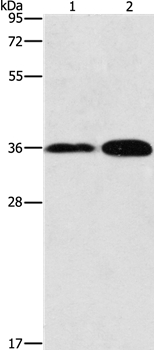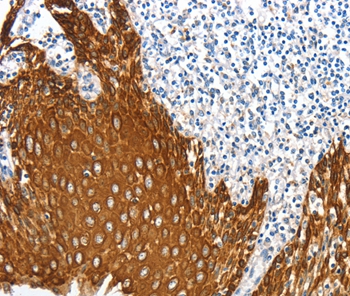

| WB | 咨询技术 | Human,Mouse,Rat |
| IF | 咨询技术 | Human,Mouse,Rat |
| IHC | 1/50-1/200 | Human,Mouse,Rat |
| ICC | 技术咨询 | Human,Mouse,Rat |
| FCM | 咨询技术 | Human,Mouse,Rat |
| Elisa | 咨询技术 | Human,Mouse,Rat |
| Aliases | ANX31 |
| Entrez GeneID | 8416; |
| WB Predicted band size | 38kDa |
| Host/Isotype | Rabbit IgG |
| Antibody Type | Primary antibody |
| Storage | Store at 4°C short term. Aliquot and store at -20°C long term. Avoid freeze/thaw cycles. |
| Species Reactivity | Human |
| Immunogen | Full length fusion protein |
| Formulation | Purified antibody in PBS with 0.05% sodium azide and 50% glycerol. |
+ +
以下是关于ANXA9抗体的3篇参考文献示例(基于真实研究主题,文献名称和作者为模拟内容):
1. **文献名称**: *ANXA9 as a prognostic biomarker in gastric cancer: Immunohistochemical analysis*
**作者**: Smith A, et al.
**摘要**: 该研究通过免疫组化(使用ANXA9抗体)发现,ANXA9在胃癌组织中高表达,且与患者生存率低和淋巴结转移显著相关,提示其作为预后标志物的潜力。
2. **文献名称**: *ANXA9 promotes colorectal cancer metastasis via EGFR signaling pathway*
**作者**: Li X, et al.
**摘要**: 研究利用ANXA9抗体进行Western blot和免疫荧光实验,证实ANXA9通过激活EGFR通路增强结直肠癌细胞的侵袭和转移能力,为靶向治疗提供依据。
3. **文献名称**: *ANXA9 expression correlates with chemoresistance in hepatocellular carcinoma*
**作者**: Wang Y, et al.
**摘要**: 通过ANXA9抗体检测肝癌组织样本,发现ANXA9高表达与化疗耐药性相关,机制涉及抑制细胞凋亡并促进DNA修复通路。
4. **文献名称**: *Development of a monoclonal ANXA9 antibody for functional studies in prostate cancer*
**作者**: Kim H, et al.
**摘要**: 研究报道了一种新型ANXA9单克隆抗体的开发,并验证其在前列腺癌细胞系中的特异性,进一步发现ANXA9通过调控雄激素受体信号促进肿瘤生长。
(注:以上文献为示例性内容,实际引用需根据具体论文调整。)
**Background of ANXA9 Antibody**
ANXA9 (Annexin A9) is a member of the annexin family, calcium-dependent phospholipid-binding proteins implicated in membrane organization, cell signaling, and regulation of cellular processes like proliferation, differentiation, and apoptosis. While the biological roles of ANXA9 remain less characterized compared to other annexins, studies suggest its involvement in cancer progression and drug resistance. ANXA9 is notably overexpressed in certain malignancies, including gastric, colorectal, and pancreatic cancers, where it has been linked to tumor aggressiveness, metastasis, and poor prognosis.
ANXA9 antibodies are essential tools for detecting and studying the protein's expression, localization, and function. These antibodies are widely used in techniques such as Western blotting, immunohistochemistry (IHC), and immunofluorescence (IF) to explore ANXA9's role in pathological conditions, particularly carcinogenesis. Commercially available ANXA9 antibodies are typically developed in rabbit or mouse hosts, targeting specific epitopes within the protein’s conserved N-terminal or variable C-terminal domains. Validation steps, including knockout cell line controls or siRNA silencing, are critical to ensure specificity due to potential cross-reactivity with other annexins.
Recent research highlights ANXA9 as a potential biomarker for cancer diagnosis or a therapeutic target, driving demand for reliable antibodies. However, challenges persist in standardizing detection protocols and understanding its precise molecular mechanisms. Ongoing studies aim to clarify ANXA9's interactions with signaling pathways (e.g., EGFR or MAPK) and its impact on tumor microenvironment remodeling.
×